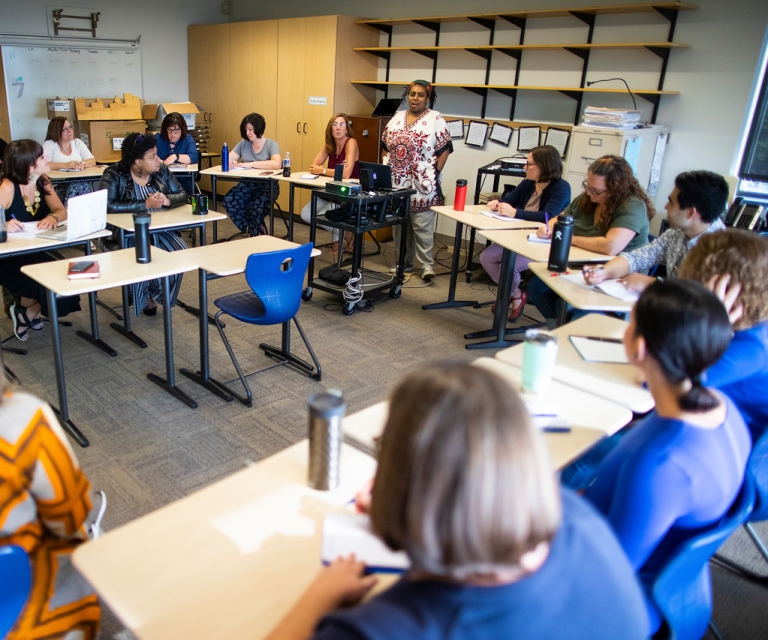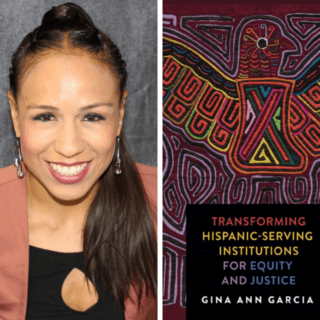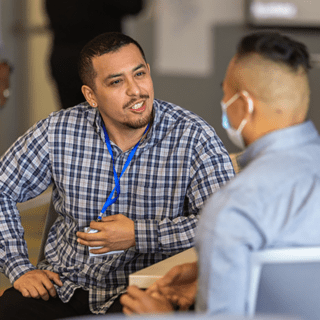
Educators and Researchers Convene to Shift Power in Educational Research
This fall, a cohort of 20 Black and Latinx educators and 20 researchers began the design and implementation of an emancipatory research process that positions educators to lead equity-centered research in PreK-12 learning spaces.
Shifting Power in Educational Research and Development (Shifting Power) is a collaborative initiative between Remake Learning and the University of Pittsburgh School of Education — and funded by the Bill & Melinda Gates Foundation — that aims to shift power dynamics inherent in many research and development (R&D) infrastructures.
Typically, educational research is driven by researchers whose technical expertise, knowledge, and biases frame the objectives and parameters of the research. It is often structured with the goal of publishing articles on learning for an academic audience, rather than producing practical solutions for the very educators and students who informed the research.
Shifting Power aims to fundamentally change the field’s understanding of what constitutes meaningful research and what is required to cultivate it. By intentionally centering the 20 participating Black and Latinx educators at every stage of the process, the initiative will elevate their experiences, points of view, challenges, and curiosities in educational research.
Participants were selected following an application process this summer. The 2020-21 cohort includes 20 Black and Latinx PreK-12 classroom teachers, paraprofessionals, out-of-school providers and teaching artists, as well as 20 university-based, non-profit, and independent researchers and learning scientists.
In September, the cohort came together for a virtual meet-and-greet intended to provide initial motivation, grounding, and connection. On Saturday, October 10, the cohort met again to delve further into concepts of equity, justice, and transformative research.
Reflecting on this recent collaboration session, Shifting Power Co-Principal Investigator Allyce Pinchback-Johnson remarked: “The learning and conversations that occurred were so powerful that we decided to push the agenda aside and allow the dialogue to flow organically. These safe spaces of fellowship are so important for Black and Latinx educators as they navigate learning spaces that are not always welcoming and affirming. In just a short time, the educator-researcher pairs are already thinking critically about these concepts as they develop their research questions.”
The Power of Collaboration
This school year, educators and researchers will collaborate in pairs to co-develop and implement research projects in the educators’ learning spaces.
Topics of interest for participants include digital literacy and effective distance learning practices, Black youth’s exposure to STEM and its impact on self-confidence, social emotional wellness, the impact of the arts, self-directed learning, and African-centered education, among many others. In addition to their research projects, participants will engage in a number of learning opportunities hosted by the PittEd Justice Collective to grow in their racial consciousness and ability to lead conversations about education practice and research.
Cynthia “Muffy” Mendoza, founder of Brown Mamas, a support group for Black mothers in Pittsburgh, is bringing to the project her perspective as a homeschooling parent. Along with her husband, Mack, she has homeschooled three of their boys. This year, she co-founded the Black Homeschooling Society, which is a collaborative between several homeschooling parents.
“Homeschooling is only possible when you are working from an empowered parent perspective,” says Mendoza. “So far, I have learned a lot from the program. It is introducing me to other people who feel the way that I do about education.”
Another educator involved in Shifting Power is Sister IAsia Thomas, the project manager within the Pittsburgh Public Schools (PPS) Office of Equity.
At the Saturday kick-off session, Thomas gave an opening presentation on the multiple ways of knowing, experiencing, exploring, and questioning the world from the lens of equity. Within PPS, she addresses cultural relevance in pedagogy and student identity across the school district.
“I’m humbled that I’ll be able to not only be in collaboration with but to be mentored and respected by my project collaborator,” says Thomas.
She is paired on the project with April Warren-Grice of Liberated Genius LLC. The two have already begun a deep exploration of equity, transformation, leadership, and justice in the American education system.
Shifting Power for the Future
In addition to producing research and solutions relevant to the participating educators and their students, the hope is that this experience will inform equity-centered R&D processes nation-wide.
Throughout the year, a dedicated project team will document participant experiences and insights regarding when and how power is shifted. The resulting case studies will be published beginning in late 2021 and disseminated to support more emancipatory educator and researcher collaborations in the future.
“From this initiative, we can positively reshape what it means for educators and researchers to collaborate, to think with each other, and to investigate pressing issues that impact the direction of teaching, learning, and engagement,” said Valerie Kinloch, Renée and Richard Goldman Dean of the University of Pittsburgh School of Education and Shifting Power Co-Principal Investigator. “This is an important opportunity for us to engage in transformative educational research and practice within schools and communities as we Shift Power.”
Meet the Shifting Power Members
Congratulations to these members of the 2020-21 Shifting Power in Educational Research and Development cohort.
Educators:
Lisa Marie Benavides
Homewood Children’s Village
Candace Burgess
Pittsburgh Festival Opera
Alesha Clinton
Propel Schools
Alonna Cuffe
Propel Schools
Eduardo Fajardo
Pittsburgh Public Schools
Delana Flowers
Teaching Artist
David Hairston
Pittsburgh Public Schools
Shaasia Jackson
Pittsburgh Public Schools
Malimi Joram Kazi
Provident Charter School
Cynthia “Muffy” Mendoza
Homeschooling Parent
Jason Orr
Propel Schools
Lisa Pickett
Pittsburgh Public Schools
John Robertson
Pittsburgh Public Schools
Andre Samuel
The Citizen Science Lab
Sister IAsia Thomas
Pittsburgh Public Schools and Children’s Windows to Africa
Amil Nyerere Thomas Cook
Propel Schools
Ginger Thompkins
Pittsburgh Public Schools
Stacy Tweedy
Nazareth Prep
Deshanna Melinda Wisniewski
Hampton Township
Judith Williams-Wright
Propel Schools
Researchers:
June Ahn
University of California Irvine, School of Education
Laura Aldrete
Trying Together
Eleanor Anderson
University of Pittsburgh, School of Education
Christina Marie Ashwin
Chatham University
Kayla Booth
University of Pittsburgh, School of Computing and Information
Amanda Brown Cross
University of Pittsburgh, Office of Child Development
M. Beatrice Dias
Carnegie Mellon University, CREATE Lab
Kimberly Kris Floyd
West Virginia University, College of Education and Human Services
Caitlin Forbes Spear
University of Pittsburgh, Office of Child Development
Sarah Hamilton
Independent Researcher
Josie Innamorato
Allegheny Intermediate Unit
Shamya Karumbaiah
University of Pennsylvania, Penn Center for Learning Analytics
Kristina N. LaVenia
Bowling Green State University, School of Educational Foundations, Leadership & Policy
Channing L. Moreland, EdD, NCC
University of Pittsburgh, School of Health and Rehabilitation Sciences (SHRS)
Rachel Robertson
University of Pittsburgh, School of Education
Candice C. Robinson
University of Pittsburgh, School of Social Work
Edward Elkanah Scott Sr.
Slippery Rock University of Pennsylvania, School of Business
Sarah Selmer
West Virginia University, College of Education and Human Services
Jean-Jacques Ngor Sene
Chatham University, School of Arts, Science & Business
April Warren-Grice
Liberated Genius, LLC




